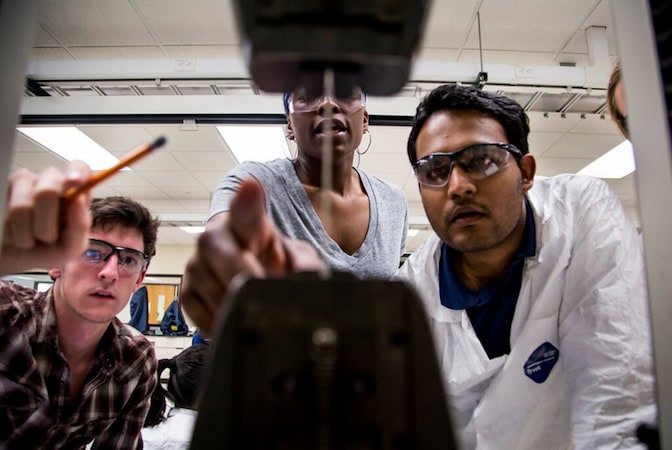
SUGS: Get on the inside track to a faster master’s
The SUGS program is a uniquely efficient way to experience grad school at Michigan Engineering.

The SUGS program is a uniquely efficient way to experience grad school at Michigan Engineering.
The Sequential Undergraduate-Graduate Studies (SUGS) program at Michigan Engineering— sometimes referred to as a combined BS/MS degree, a BSE/MSE degree, or a fast-tracked master’s degree—is a way for you to earn a master’s in as little as one year of study after your bachelor’s degree.
It’s a cost-effective, accelerated way to get ahead in your field. You’ll complete both of your degrees in around 5 years, which is significantly shorter than the average 6 years it can take to complete a bachelor’s and master’s degree separately.
Connect with your department’s SUGS or master’s coordinator
For most students, SUGS is a one-year commitment to add to your undergraduate experience. In that year, you can take classes to specialize in the field you’re interested in, building on both the knowledge and skills that you have gained from your undergraduate experience. In one year, you earn a whole new degree for your efforts, one that’s tailored to your passions.
“SUGS gives you an opportunity to learn things that you want to, just for an extra little bit of time, and you’ll get a whole new degree that will help you a whole lot in the work force,” said mechanical engineering SUGS graduate Lea Russo.
What if you don’t know what you’re passionate about yet? Or just as likely for a Michigan Engineer, you’re passionate about too many things.
SUGS students report that it’s a great opportunity to expand your horizons so that you don’t spend as much of your working career “figuring things out.” SUGS alumni report that getting a master’s degree, especially one that’s accelerated, helped them quickly figure out whether they were interested in research, industry or expanding into another field.
This engineering program results in a faster master’s, but it’s still a full-time University of Michigan graduate program. Most SUGS programs are administered by the Rackham Graduate School, though a few are run by individual engineering departments. Visit the Rackham website or the College of Engineering Bulletin to learn more about:
Engineering students declare their interest in SUGS the second term of their junior year. You should start exploring SUGS options and talking with your advisor about SUGS during your sophomore year.
Our best advice to all first-year and second-year students: You can ensure SUGS is an option for you later on by focusing on doing well in your classes. SUGS degrees have minimum undergraduate grade point averages, and they vary by program.
Once you are fairly confident about your interests and passions, you can explore specific departments and degrees in the Michigan Engineering Bulletin.
When most students ask this question, they are thinking about future salary. Having a master’s degree increases your earning potential after graduation, and it also widens your choices. There are roles that you can only get access to with an advanced degree or experience.
“It all comes down to being able to deepen your understanding of certain topics that you’re really passionate about or that you think will serve you well in your future career. Whether as an engineer, as a physician, or as a scientist…” said biomedical engineering SUGS graduate Ivo Cerda Woldarsky.
However, it’s still full-time grad school; there are financial considerations that you need to think about, and unlike PhDs, master’s degrees are not typically funded. In some cases there are positions like graduate student instructor or researcher roles that can help you pay the bills while deepening your interests and refining your career goals. And if you already know you want a master’s degree someday, this will save you about a year’s worth of time and money.
As engineers, we know that it takes less energy to continue moving in a similar direction. Fewer credits, less time, less friction between you and your goal—this might be the best time for you to get your graduate degree. In addition, instead of exiting as an entry-level engineer, you graduate as a master of engineering.
It’s about having a college mindset and using it while you still have it, instead of setting yourself up for a drastic change later on, said Ricardo Lopez (BSE NERS ’20, MSE ’21) and SUGS graduate. In simple terms, it’ll be harder to go back to school.